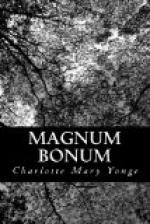“We tried both practising and lecturing, feeling our way meantime towards the Magnum Bonum. We found, however, in the larger cities that people were quite as careful about qualifications as at home, and that we wanted recommendations. I could have got some practice among women if Demetrius would have rested long enough anywhere, but he liked lecturing best. I had been obliged to perceive that he had very little real science, and indeed I had to give him the facts and he put them in his flowery language. While as to Magnum Bonum, he had gained enough to use it in a kind of haphazard way, for everything. I trembled at what he began doing with it, when in the course of our wanderings we got out of the more established regions into the south-west. In Texas we found a new township, called Burkeville, without a resident medical man, and the fame of his lectures had gone far enough for him to be accepted. There we set up our staff, and Demetrius-it makes me sick to say so-tried to establish himself as the possessor of a new and certain cure. I was persuaded that he did not know how to manage it, I tried to make him understand that under certain conditions it might be fatal, but he thought I was jealous. He had had one or two remarkable successes, his fame was spreading, he was getting reckless, and I could not watch as carefully as I sometimes did, for my child was ill, and needed all my care. The favourite of all the parish was the minister’s daughter, a beautiful, lively, delicate girl, loved and followed like a sort of queen by the young men, of whom there were many, while there were hardly any other young women, none to compare with her. Demetrius had lost some patients, it was a sickly season, and I fancy there was some mistrust and exasperation against him already, for he was incompetent, and grew more averse to consulting me when his knowledge was at fault. I need not blame him. Everyone at home knows that I do not always make myself agreeable, and I had enough to exacerbate me, with my child pining in the unhealthy climate, and my father’s precious secret used with the rough ignorance of an empiric. I knew enough of the case of this Annie Field to be sure that there were features in it which would make that form of treatment dangerous. I tried to make him understand. He thought me jealous of his being called in rather than myself. Well- she died, and such a storm of vengeance arose as is possible in those lawless parts. I knew and heeded nothing of it, for my little Glykera was worse every day, and I thought of nothing else, but it seems that reports unfavourable to us had come from some one of the cities where we had tried to settle, and thus grief and rage had almost maddened one of Annie’s lovers, a young man of Irish blood, a leader among the rest. On the day of her funeral all the ruffianism in the place was up in arms against us. My husband had warning, I suppose, for I never saw or heard of him since he went out that morning, leaving me with my little one moaning on my lap. She was growing worse every hour, and I knew nothing else, till my door was burst open by a little boy of eight or ten years old, crying out, ’Mrs. Hermann, Mrs. Hermann, quick, they are coming to lynch you! come away, bring the baby. If father can’t stop them, there’s no place safe but our house.’




